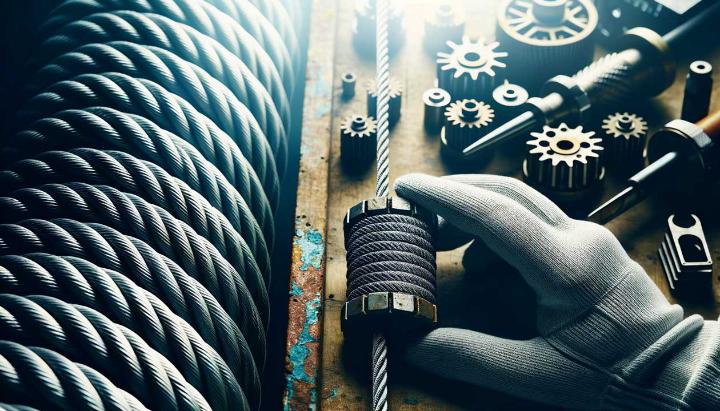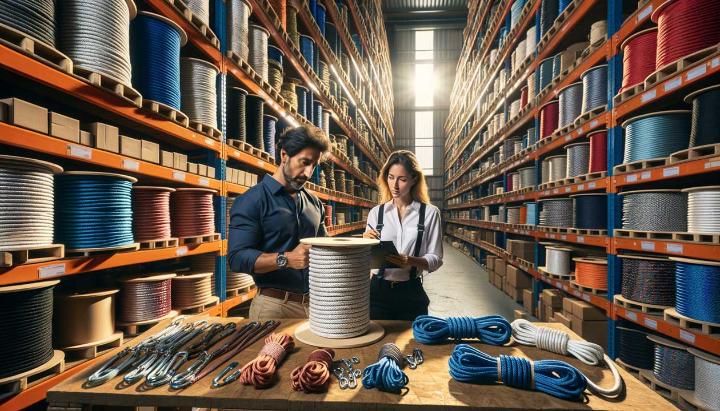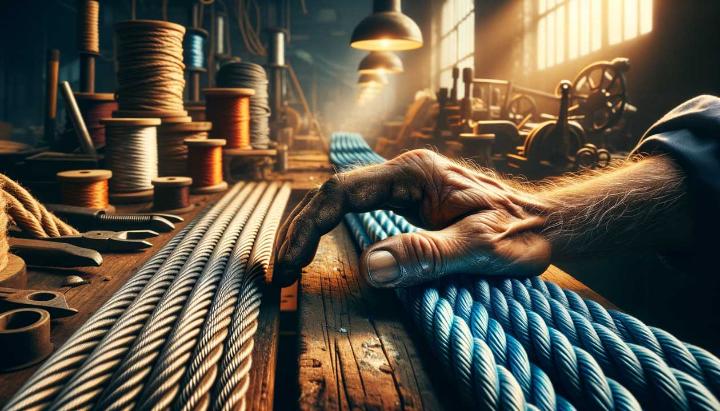Have you ever found yourself caught between the tried-and-true strength of steel wire rope and the modern allure of synthetic alternatives? You're not alone. In the world of industrial rigging and marine applications, the choice between these two titans can make or break your project—literally. But here's the kicker: neither option is perfect.
As a seasoned rope specialist with over two decades of experience, I've seen firsthand how both steel wire and synthetic ropes can excel—and fail—in various situations. Today, we're diving deep into the nitty-gritty of steel wire rope vs synthetic rope, and more importantly, where you should buy these critical components for your operations.
Whether you're looking to buy rope for a massive offshore project or a specialized industrial application, understanding the pros and cons of each type is crucial. But equally important is knowing where to source your ropes from. After all, a rope is only as good as its manufacturer.
In this comprehensive guide, we'll not only compare the strengths and weaknesses of steel wire and synthetic ropes but also provide you with insider knowledge on how to choose the right supplier. By the end, you'll be equipped to make an informed decision that could save you time, money, and potentially, lives. So, are you ready to unravel the complexities of rope selection and procurement? Let's get started.
Disadvantages of Steel Wire Rope
While steel wire rope has been a stalwart in various industries for decades, it's not without its drawbacks. As someone who's worked with both steel and synthetic ropes, I've experienced firsthand the challenges that come with steel wire. Let's dive into some of the key limitations you should consider before deciding to buy wire rope.
Limitations in Flexibility and Durability
Have you ever tried to coil a steel wire rope on a cold morning? It's like wrestling with a stubborn snake! The lack of flexibility is one of the most noticeable disadvantages of steel wire rope. This rigidity not only makes handling difficult but also impacts its performance in certain applications.
- Susceptibility to fatigue and wear: Steel wire ropes are prone to fatigue fracture, especially when subjected to repeated bending or flexing. Over time, this can lead to reduced strength and potential failure.
- Corrosion concerns: If you've ever left a steel tool out in the rain, you know how quickly rust can set in. Steel wire ropes are no different, making them unsuitable for use in corrosive environments without proper maintenance.
- Weight issues: Compared to synthetic alternatives, steel wire ropes are significantly heavier. This can be a major drawback in applications where weight is a critical factor.
Did You Know?
Steel wire rope can suffer heat damage at temperatures above 400°F, limiting its use in high-temperature environments.
Safety Concerns and Maintenance Issues
As someone who values safety above all else, I can't stress enough the importance of understanding the potential risks associated with steel wire ropes. Let's break down some of the key safety and maintenance concerns:
- Broken wire hazards: Over time, individual wires in the rope can break, creating sharp edges that pose a significant risk of hand injuries during handling.
- High maintenance requirements: To ensure longevity and safe operation, steel wire ropes need regular inspection, cleaning, and lubrication. This can be time-consuming and costly.
- Limited repairability: Due to their complex construction, repairing damaged steel wire ropes is often difficult or impossible, leading to more frequent replacements.
While steel wire rope certainly has its place in many industries, it's crucial to weigh these disadvantages against your specific needs. Have you considered how these limitations might impact your project or application? In many cases, synthetic rope alternatives might offer a more suitable solution, especially when flexibility, weight, and ease of handling are primary concerns.
Always prioritize safety when working with steel wire ropes. Regular inspections and proper handling techniques are essential to prevent accidents and injuries.
Remember, choosing the right rope for your needs involves carefully considering all aspects, including these potential drawbacks. Don't hesitate to consult with rope specialists or explore synthetic alternatives if you're unsure about the suitability of steel wire rope for your application.
Disadvantages of Synthetic Rope: Understanding the Limitations
As someone who's worked extensively with both steel wire and synthetic ropes, I can tell you that while synthetic options have gained immense popularity, they're not without their drawbacks. Let's dive into the limitations you should be aware of before deciding to buy a rope for your next project.
Lower Abrasion Resistance and UV Vulnerability
Picture this: you're out on a winching expedition, and your synthetic rope is rubbing against rough terrain. Unlike steel wire rope, synthetic fibres can quickly show signs of wear. I've seen firsthand how abrasion can compromise the integrity of these ropes, especially in harsh environments.
- Abrasion weakness: Synthetic ropes are more susceptible to fraying and weakening when exposed to rough surfaces or edges.
- UV damage concerns: Extended exposure to sunlight can degrade synthetic fibres, reducing the rope's strength over time.
- Protective measures: Using sleeves or covers can help mitigate these issues, but it's an extra step in maintenance and cost.

Cost Considerations of Synthetic vs Steel Rope
When it comes to your wallet, synthetic ropes can give it quite a workout. From my experience managing equipment budgets, I've noticed that the initial cost of synthetic ropes can be a shock compared to their steel counterparts.
- Higher upfront investment: Synthetic ropes often come with a steeper price tag, which can be a significant factor for budget-conscious buyers.
- Long-term value: Despite the higher initial cost, synthetic ropes can offer better value over time in certain applications due to their lighter weight and ease of handling.
- Replacement frequency: Depending on usage and care, you might find yourself replacing synthetic ropes more often than steel wire ropes.
Maintenance Challenges for Synthetic Winch Ropes
If you think synthetic ropes are a "set it and forget it" solution, think again. I've learned the hard way that proper care is crucial for longevity.
- Regular inspections: Synthetic ropes require frequent checks for signs of wear, UV damage, or chemical exposure.
- Cleaning requirements: Unlike steel wire ropes, synthetics need thorough cleaning to remove abrasive particles that can damage the fibres.
- Storage considerations: Proper storage away from sunlight and chemicals is essential to maintain the rope's integrity.
Did you know? With proper care and maintenance, synthetic winch ropes can last up to 10 years. However, this lifespan can be significantly reduced without regular attention to their condition and usage environment.
While synthetic ropes offer numerous advantages, it's crucial to weigh these limitations against your specific needs. Have you considered how these factors might impact your operations or project requirements? Remember, the key to making the right choice lies in understanding both the strengths and weaknesses of your rope options.
Factors to consider when deciding where to buy rope
When it comes to buying rope, whether you're a seasoned climber or a professional in the industrial sector, making the right choice is crucial. As someone who's spent years working with various types of ropes, I've learned that where you buy your rope can be just as important as the rope itself. Let's dive into the key factors you should consider before making your purchase.
Reputation and expertise of the rope supplier
Have you ever bought a piece of gear from a supplier who couldn't answer basic questions about their products? It's frustrating, isn't it? That's why the reputation and expertise of your rope supplier should be at the top of your list when deciding where to buy rope.
- Industry experience: Look for suppliers with a proven track record in the rope industry. Their experience can be invaluable when you need advice on the best rope for your specific application.
- Customer reviews: Don't just take their word for it - check out what other customers are saying. Positive reviews and testimonials can give you confidence in your choice.
- Technical knowledge: A supplier who understands the technical aspects of rope manufacturing and usage can guide you towards the most suitable product for your needs.
Range of rope products and customization options
Imagine walking into a rope store and finding only one type of rope. Sounds limiting, doesn't it? That's why a wide range of products and customization options is crucial when choosing where to buy your rope.
- Variety of rope types: From dynamic climbing ropes to static industrial ropes, ensure your supplier offers a comprehensive selection to meet diverse needs.
- Customization capabilities: Sometimes, off-the-shelf solutions just won't cut it. Look for suppliers who can tailor ropes to your specific requirements.
- Accessories and complementary products: A one-stop-shop for all your rope-related needs can save you time and hassle.

Quality assurance and certifications
When your safety is on the line, you can't afford to compromise on quality. That's why certifications and quality assurance processes are non-negotiable when choosing a rope supplier.
- ISO 9001 certification: This international standard ensures consistent quality in manufacturing processes.
- UIAA certification: For climbing ropes, this certification is crucial as it guarantees the rope meets rigorous safety standards.
- Quality control processes: Ask about the supplier's quality control measures. Regular testing and inspection can make a world of difference in rope reliability.
Pricing and cost-effectiveness
While it's tempting to go for the cheapest option, remember that with ropes, you often get what you pay for. However, that doesn't mean you should overpay either.
- Competitive pricing: Compare prices across different suppliers, but be wary of deals that seem too good to be true.
- Value for money: Consider the long-term value. A slightly more expensive rope that lasts longer can be more cost-effective in the long run.
- Bulk purchase options: If you regularly need ropes, look for suppliers offering discounts on bulk purchases.
Pro tip: Don't forget to factor in shipping costs when comparing prices. Some suppliers might offer free shipping on orders above a certain value, which could influence your decision on where to buy rope.
Choosing where to buy your rope is a decision that shouldn't be taken lightly. By considering these factors - reputation, product range, quality assurance, and pricing - you'll be well-equipped to find a supplier that meets your needs. Remember, the right rope can make all the difference in your project or adventure. So, take your time, do your research, and choose wisely. Your safety and success might just depend on it.
iRopes: Your Trusted Supplier for High-Quality Ropes
When it comes to buying rope, finding a reliable supplier can be as crucial as choosing the right type of rope itself. That's where iRopes comes in. As someone who's worked in the rope industry for over two decades, I can confidently say that iRopes stands out as a beacon of quality and innovation in the world of rope manufacturing.
Industry-Leading Rope Manufacturing Excellence
iRopes isn't just another rope manufacturer; it's a company that breathes life into every strand they produce. With 15 years of experience under their belt, they've perfected the art of rope-making to a science. But what really sets them apart?
- Cutting-edge technology: iRopes employs state-of-the-art machinery and techniques to ensure every rope meets the highest standards of quality.
- Rigorous quality control: Each rope undergoes multiple inspections throughout the manufacturing process, guaranteeing strength and reliability.
- Premium materials: Only the finest raw materials make it into iRopes' products, resulting in ropes that are not just strong, but also durable and long-lasting.

I've personally visited iRopes' manufacturing facility, and let me tell you, it's a sight to behold. The precision and care that goes into each rope is truly remarkable. It's this commitment to excellence that has earned iRopes its ISO 9001 certification, a testament to their unwavering dedication to quality.
Custom Rope Solutions for Diverse Industries
One size doesn't fit all when it comes to ropes, and iRopes understands this better than anyone. Their ability to create tailored solutions for a wide range of industries is nothing short of impressive. Whether you're in the marine sector, sports industry, or need industrial-grade ropes for heavy-duty applications, iRopes has got you covered.
- Marine ropes: From mooring lines to anchor ropes, iRopes provides durable solutions that withstand harsh marine environments.
- Sports ropes: Climbers and athletes trust iRopes for their safety, with high-performance ropes designed for maximum strength and minimal weight.
- Industrial ropes: When safety is paramount, industries turn to iRopes for reliable, heavy-duty solutions that meet strict safety standards.
But it's not just about having a wide range of products. iRopes goes the extra mile by offering customization options that cater to specific needs. Need a rope with unique specifications? iRopes' team of experts will work with you to create a solution that fits like a glove.
Did you know? iRopes can create custom-colored ropes to match your brand or specific visibility requirements, adding both functionality and style to your rope solutions.
What truly sets iRopes apart is their commitment to customer satisfaction. They don't just sell you a rope; they provide a complete solution. From helping you choose the right type of rope for your application to offering advice on maintenance and usage, iRopes is there every step of the way.
In my years of experience, I've seen many rope suppliers come and go, but iRopes has consistently stood out as a reliable partner for businesses across various industries. Their combination of quality products, customization capabilities, and exceptional customer service makes them a trustworthy choice for anyone looking to buy rope. Learn more about how iRopes compares to leading US rope manufacturers in terms of quality and reliability.
So, the next time you're in the market for high-quality, customized ropes, remember iRopes. With their industry-leading manufacturing excellence and commitment to meeting diverse needs, you can trust that you're getting more than just a rope – you're investing in safety, reliability, and peace of mind. For more insights, check out our article on synthetic vs. natural fiber ropes and which one might be the better choice for your needs.
Deciding where to buy rope involves understanding the distinct disadvantages of both steel wire rope and synthetic rope. Steel wire rope can be prone to corrosion, heavy weight, reduced maneuverability, and safety hazards due to broken wires, whereas synthetic ropes face issues like lower heat resistance, UV degradation, and potential elongation under strain. When considering to buy a rope, assess the supplier's reputation, product range, quality certifications, and cost-effectiveness. As a leading manufacturer, iRopes offers high-quality steel wire and synthetic rope solutions, backed by ISO 9001 certification, competitive pricing, and global shipping. Trust iRopes for your customised rope needs, ensuring you buy wire rope that stands up to your demands.
Get a Custom Rope Solution Today!
If you're ready to buy rope that matches your specific requirements, fill in the form above. Let iRopes provide you with the perfect rope solution backed by industry expertise, quality assurance, and reliable service.